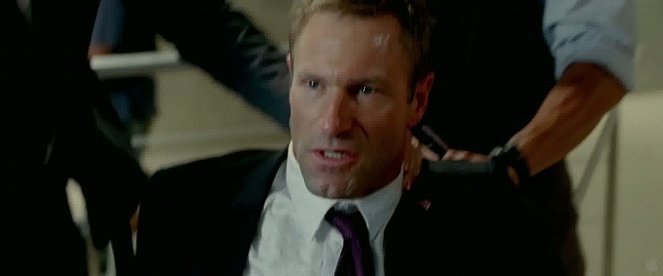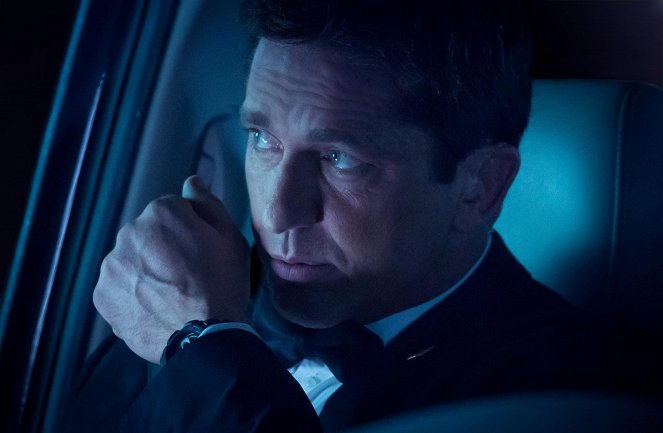Director:
Antoine FuquaCámara:
Conrad W. HallMúsica:
Trevor MorrisReparto:
Gerard Butler, Aaron Eckhart, Finley Jacobsen, Dylan McDermott, Rick Yune, Morgan Freeman, Angela Bassett, Melissa Leo, Radha Mitchell, Cole Hauser (más)Streaming (2)
Sinopsis(1)
Mike Banning (Gerard Butler) es un agente del Servicio Secreto estadounidense que, tras un accidente de coche en el que únicamente puede salvar la vida del Presidente Asher (Aaron Eckhart), decide dejarlo para trabajar en el Departamento del Tesoro. Pero cuando un comando coreano liderado por Kang (Rick Yune) ataca la Casa Blanca, tomando como rehenes al Presidente y su gabinete, Banning se verá obligado a entrar de nuevo en acción. (Entertainment One Films Spain)
(más)Videos (13)
Reseñas (11)
Praise God! Anti-crisis, pro-American propaganda in a pure action package whose creators have apparently watched nothing but Roland Emmerich and Michael Bay movies in the past twenty years. But they very well remember Die Hard and all of the Chuck Norris shoot ’em ups from the eighties. (The comparison with McTiernan’s film requires some further elaboration: though Die Hard and Olympus Has Fallen both respond in a certain way to the crisis of masculinity, and the destruction of phallic objects – Nakatomi Plaza and the Washington Monument, respectively – is a significant visual element in each film, McClane MUST shoot the bad guys and his reward is the regained respect of his wife; conversely, Banning WANTS to shoot the bad guys and he sees his involvement in the action as a service to his country and a way to make up for a previous mistake.) ___ It’s stupid. It’s charmingly and unbelievably stupid and inappropriately serious, but thanks to the work with deadlines and the well-thought-out distribution of action scenes, it has a fast pace, an R rating and a roughly ten-second OTT shot of a charred American flag falling in slow motion from the White House balcony. It’s been a long time since we’ve seen such rewarding material for a study of ideological practices in Hollywood genre filmmaking. ___ The opening aerial shot familiarises us with the majesty of the American landscape, represented in the following minutes by “more civilised” symbols. There is always room in the shot for the White House or at least the American flag, properly placed so that we are guaranteed to notice it (even a “randomly” passing bus is painted in the national colours). The intro briefly acquaints us with both of the male protagonists (the president as a tough guy who knows how to box and is fully devoted to his country, but he doesn’t ignore his family; Mike also as a tough guy, but family-oriented and popular with children) and another way of relating to American values – tradition is important, the legacy of the forebears, represented here by the grandfather’s watch (which, after the death of the president’s wife, takes on a secondary, somewhat fetishistic significance – it brings the woman, or rather the family, into the present). As on September 11th, the attack comes from the air. This time, however, America’s defenders are ready, they know how to respond (the president does not just sit impassively, but goes into the bunker), and if the architectural symbol of American democracy is eventually occupied anyway, it’s because of the numerical superiority and overwhelming force brought to bear by the attackers (whose high-grade military equipment could be the envy of any army in the world). ___ Though the resolution of foreign conflicts is exclusively in the purview of the Americans, they don’t intervene anywhere – rather, they are attacked (by the citizens of one of the last countries that is not in any way important to the American film industry) and have to defend themselves. As previously outlined, it is necessary to defend democratic values, of which the United States, because of its long tradition of democracy, considers itself to be the global guarantor (the ubiquitous portraits of former American presidents, the old cannon in front of the White House and the bust of Lincoln with which Mike pacifies an adversary are all characteristic of this). If the terrorists cite “fucking Wall Street”, i.e. destructive capitalism, as the reason for their attack, they have misunderstood the values on which American society is built, namely family and democracy, which, unlike money, do not corrupt one’s character but improve it, and are thus inviolable. ___ The film’s biggest hero is the white president (the black “president” only fills in for him, even though he has incomparably more charisma and life experience). He is a decisive, infallible man who personifies “Americanness”. Therefore, his life is more important than the life of anyone else. After the attack, the other characters are primarily interested in knowing whether the president is okay, not whether their loved ones have been harmed or whether they themselves are injured. The lives of a select few have much greater value than the lives of thousands of anonymous people getting shot to pieces (the individual is valued more highly than the group). ___ In connection with the emphasis on individual merit, saving the world falls within the competency of heroic individuals with special skills, not the group with its modern technologies, which are turned against their creators (the exemplarily incompetent military). However, the nuclear weapons that the United States could use to defend itself in the event of an attack are not what’s bad here; what’s bad is the terrorists who want to take control of those weapons. Or, said another way, the evil comes from the outside, which also applies to Kang’s threat of poverty (the blame would thus be shifted from the “capitalist” financial crisis to the terrorists). Similarly, the torturing and killing of women are acceptable if you inflict them on people who have no aversion to killing a dog or beating a woman. ___ The message of the film, which guilelessly (and like the futurists who many years ago considered war to be the only means of cleansing the world) points to the revitalising function of historical crises (and thus mitigates fears of the incessantly mentioned crisis of whatever), is wonderfully simple – we do not negotiate with terrorists and you don’t fuck with the USA! One can be either amused or disgusted by that. I chose the first option and I don’t regret the two hours that I spent with Olympus Has Fallen, though I'm also quite disturbed by the idea that it was meant to be taken deadly seriously. 75%
()
(menos)
(más)
I’ve once read an ironic comment saying that actors are the best paid prostitutes in the world. I didn’t think much of it at the time, but this film is a clear example of it. What they say here in the second half with a stony face, completely serious and full of pathos, is enough to put down even a self-deprecating masochist. And most of all, I felt sorry for Morgan Freeman. His participation, pushed through by the producers just to tick off at least one famous name, is reduced to the one clueless, apathetic expression, when it's quite obvious that Morgan has nothing to play with, and one annoyed expression of a few seconds that doesn’t make any difference. The American president here is a paragon of honesty, bravery, and an awareness of the gravity of his position when you're just waiting for the shit to really hit the fan. All the lines that fly through the air between Butler, the military staff and the terrorist boss are the essence of idiocy, and the slow-motion scenes with an American flag riddled with bullet holes, the 'Cerberus code' and the heroic cry of "I pledge allegiance to the flag of the United States of America!" will strike you as a major infringement on the audience's taste. During the first 45 minutes or so things go well, thanks to the old-fashioned 80s style action, with terrorists and bodyguards falling like flies (I hereby salute Arnold), but then the ghost of Chuck Norris possessed all the actors and especially the writers, and everything goes to shit in the blink of an eye. Thanks God for Schwarzenegger’s Commando, compared to this film, it’s a funny easy-going comedy full of wisecracks.
()
Pathos to drown in. The part of the attack on the White House is stupid and with underfunded special effects, but it’s quite fun. The rest of the film, however, it’s not fun at all. It could have been a decent take on Die Hard, but the total lack of detachment and the piece of wood in the main role (there are few people in Hollywood I find more annoying than Gerard Butler) sinks it. In the second half I was just bored. PS: Naturally, the American flag flutters as a blessing. What Emmerich will show us?
()
Republican agitprop for pure American values, and the willingness to confront the problem head-on and tackle everything with a straight face. It’s a mistake to see it in the opposite vein of the movie theater premieres, as Emmerich's strumming of the "democratic" string created more thematic self-irony, bringing expectations down to zero. Fuqua irritates the audience's receptors only with his impressive body count, his willingness to shoot anyone in the head (even a woman), and he only improves the Butler machine’s skill in terms of the number of headshots. The rest of the time, it sort of wanders the darkened corridors of the White House, preferring to keep the protagonists silent because the script doesn't throw anything too miraculous at them. I can't think of which twenty minutes of the plot I would sacrifice in favor of better compactness, but, on the other hand, I place the quarter of an hour with the cast of Olympus Has Fallen on the action pedestal of the best there is to see at the moment. 2 and a ½.
()
How do you combine the ultra-pathos of shot-up flags in the glow of evening twilight and a "down to earth" thriller about a highly trained bulldozer that someone hibernated during Reagan's time? You can’t. That's what it's all about. I enjoyed the references to similar 90s films (a tumultuous steady cam, president family guy and a soundtrack on the edge of long strings and pompous walls of breaths). What I really don't like is the total lack of overview - not only in the ode to US sovereignty and the flawlessness of its watch dogs (Butlers), but especially in the image of the North Korean enemy, who is so boringly truncated to a hateful and brutal core that the fight with them lacks anything emotional, and the enemy is completely uninteresting. Alternating solid action with theatrical (and de facto completely dehumanized) speeches soon ceases to entertain. A comparison with Die Hard is out of the question - this film looks much more outdated at its core - and where it tries to look more modern, it clashes with its simplicity. It's a pity, I was really rooting for it and had a great time for the first half hour. [50%]
()


